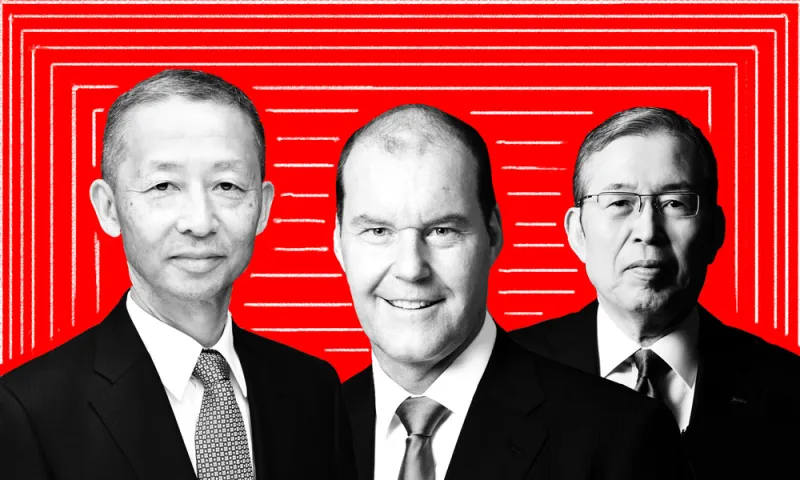Constant evolution in the face of challenges is what unites the top-scoring chief executives in Institutional Investor’s 2021 All-Japan Executive Team. Shigenobu Nagamori, chairman and chief executive of Nidec Corp., quotes Nietzsche: “The snake which cannot cast its skin has to die.”
Nagamori is once again the top-scoring chief executive in the electronic components sector for his work at Nidec, the company he founded in a prefabricated hut along the Katsura River in Kyoto in 1973. For more than 10 years, he has been searching for a successor for his business. But few hopefuls can match his resolve: After his father passed away when he was a child, Nagamori’s mother, a farmer, told him that as long as he put in twice as much effort as others, he would succeed in his endeavors.
He may be getting closer to handing over the reins after Nidec promoted Jun Seki to the role of president and chief operating officer in April 2020. Seki was the third outside executive Nagamori had recruited as a potential candidate for president. Nagamori told II that his promotion marks an end to a more non-hierarchical management structure and a return to a top-down approach as the company aims at consolidated net sales of 10 trillion yen by the financial year ending March 31, 2031.
Yasuhiko Saitoh knows well the trials of taking on a business that has been steered by the same leadership for decades. Saitoh became president of Shin-Etsu Chemical in 2016, with the tricky task of helping the company transition from the leadership of chairman Chihiro Kanagawa, who is in his nineties. The laconic executive said the most important lesson he has learned in business is “to keep learning – and that there is no end of learning.” He achieves this partly through collaboration with external partners, a strategy shared by Christophe Weber, president and chief executive at Takeda.
“If the global Covid-19 pandemic taught us anything, it’s that speed in R&D can be achieved through effective collaboration and partnerships,” Weber said. Weber believes the unprecedented amount of data-sharing and collaboration between companies was responsible for the development of potential treatments and vaccines in clinical trials in just a few short months.
The pandemic has pushed this year’s All-Japan Executive Team to develop new approaches to the way their staff work. Nagamori said Nidec is changing its approach to management, including introducing evaluations based on performance. Weber, meanwhile, said the pandemic has spurred Takeda to find innovative solutions to how and where its staff work. The company has developed a hybrid working model for the return to the office, involving a mix of in-person and virtual working and more flexibility. “We believe that this will allow us to truly build a working culture that is more agile, collaborative and with greater productivity and efficiency,” Weber said.
Shigenobu Nagamori, Nidec
What was the greatest challenge for your sector this year?The greatest challenge is to cope with global environmental problems. Especially global warming is one of the biggest issues, so the demand for the products which contribute to reduction of CO2 or saving energy is increasing. In this context, Nidec’s E-Axle (a traction motor system for electric vehicles) or brushless motor can make a huge contribution.
What was the toughest decision you made in the last year?
Change of management system to top-down decision making. The collective leadership system deployed from 2018 was slow in decisions and brought stagnation of earnings. From 2020, Nidec is back to a top-down management system [with the CEO and chief operating officer Seki serving as the two heads] and earnings are back to a growth trend.
Have there been any unexpected opportunities for your business?
Although it's not “unexpected,” the wave of electrification of automobiles is happening 10 years later than expected. As Nidec had already prepared for the wave, the company becomes a pioneer of E-Axle in the industry.
How is your company innovating?
Nidec’s innovations come from the endless efforts to find “three news,” meaning new products, new markets, and new customers. Recent examples of “three news” are the motors for mini EVs, E-Motorcycle, E-Scooter, and E-Bike. These products at new markets are expected to launch within 2021.
What's the most important lesson you have learned in your career?
“The snake which cannot cast its skin has to die,” meaning company always needs to transform. Nidec keeps transforming by introducing a new personnel system, [with] performance committed evaluations and job specified contracts, and promoting digital transformation in 2021.
Yasuhiko Saitoh, Shi-Etsu Chemical
What was the greatest challenge for your sector this year?To keep meeting customers’ growing demand in a timely manner.
What was the toughest decision you made in the last year?
Had to postpone all the business trips.
How is your company innovating?
Through close working relationships with key customers and various collaborations with innovative organizations.
What's the most important lesson you have learned in your career?
The fact that you have to keep learning and there is no end of learning.
Christophe Weber, Takeda
What was the greatest challenge for your sector this year?The Covid-19 pandemic has posed one of the greatest global challenges for the pharmaceutical industry over the last year, placing strain on health care systems and health care workers, and with stay-at-home restrictions reducing patient visits to medical care providers. However, throughout this challenging year, Takeda has demonstrated resilience in our business model, including the depth of our portfolio and commitment to our employees, as we continued to serve patients and communities globally.
In fact, our performance in the first three quarters of our full-year 2020 results demonstrates this resilience. For example, since the start of the pandemic, we have been carefully monitoring the demand trends for medicines in our portfolio, but we have seen limited impact because they predominantly target severe chronic or life-threatening diseases not requiring elective procedures. Also, in terms of our global supply chain, we have not yet seen, nor do we anticipate, any material potential supply distribution issues due to the pandemic.
What was the toughest decision you made in the last year?
At Takeda, there are many decisions that we make every day that are very impactful for the company. I personally work hard to ensure that decisions are made with careful consideration and a variety of unique perspectives and solutions.
This year, for example, Takeda has continued to execute on its strategy of divesting non-core assets in order to focus resources on our five key business areas. Sometimes this involves divesting brands that have played a key role in Takeda’s history, such as our consumer healthcare business in Japan. As an R&D-driven company committed to transforming science into life-changing medicines, we must sharpen our focus in the key business areas where we are globally competitive and can deliver the most value to patients.
Our values of Takeda-ism (integrity, honesty, perseverance, fairness) and patient-trust-reputation-business always guide our decision-making. These values underscore the importance of putting the patient at the center of everything we do, which is important now more than ever. These are the values that have helped guide us in our decisions during the Covid-19 pandemic throughout the past year and also ensure we stay aligned to our business strategy that will ultimately help us deliver growth and continued transformation.
Have there been any unexpected opportunities for your business?
If the global Covid-19 pandemic taught us anything, it’s that speed in R&D can be achieved through effective collaboration and partnerships. I’m proud of how the biopharmaceutical industry mobilized to respond to the Covid-19 pandemic. For the better part of the last year, biopharmaceutical researchers and scientists have been working around the clock to develop therapies and vaccines to fight the virus.
The level of collaboration we are seeing right now during the Covid-19 pandemic might be unprecedented for our industry, but it is not unprecedented for Takeda. We realized a long time ago that collaboration between different stakeholders can help us shorten the amount of time it takes to develop and bring life-saving treatments and therapies to patients around the world. That is why we actively engage in R&D collaborations and source innovation wherever it occurs. Partnerships like these have also been a critical part of our role in combating the Covid-19 pandemic. In fact, our teams across Takeda have come together in a variety of ways to look at opportunities with academia, industry, and governments. This includes investigating ways to repurpose marketed products and programs in development as potential treatments, researching novel approaches to treating future pandemics, data sharing initiatives, and participating in industry-wide collaborations. For example, we helped co-found the Covid R&D Alliance and the CoVIg-19 Plasma Alliance, and in addition, joined other alliances and partnerships including the Innovative Medicines Initiative CARE consortium and the Accelerating Covid-19 Therapeutic Interventions and Vaccines partnership. We are also providing manufacturing support to help enable rapid and sustained access to Covid-19 vaccines worldwide.
In addition, our ways of working have long been transforming, largely accelerated by the application of technology. This has only been further fast-tracked as many experience working remotely for the first time because of the Covid-19 pandemic. As digital technologies, machine learning, and AI continue to evolve, businesses and their employees will need to keep pace. Over the next several years, we anticipate creating hundreds of new jobs in specialized roles in emerging data and digital fields, accessing new talent pools, and upskilling thousands of existing employees to propel [Takeda’s] data and digital capabilities to deliver transformative therapies and better experiences to patients, physicians, and payers faster than previously possible.
How is your company innovating?
As a values-based and R&D-driven biopharmaceutical company celebrating 240 years this summer, we remain focused on continuing to bring life-transforming treatments to patients worldwide by delivering on our highly innovative pipeline and our continued commitment to patients, our people, and the planet. We have built and prioritized a world-class, state-of-the-art, externally-facing R&D engine that has generated an innovative and modality-diverse pipeline of approximately 40 clinical-stage new molecular entities (NMEs). We have also forged new teams and collaborations to help enable this innovation swiftly and efficiently. Altogether this is helping us to bring better health for patients and a brighter future for the world.
We recently provided an update on our Wave 1 pipeline, which includes 11 unique NMEs, representing potential best-in-class/first-in-class therapies in critical therapeutic categories such as oncology, rare genetics and hematology, neuroscience, gastroenterology, and vaccines. In fact, by the end of our fiscal year 2021, we anticipate up to six new molecular entity regulatory submissions, with the potential for four approvals. In addition, we expect seven programs in pivotal studies across 10 indications by fiscal-year-end. And R&D is cornerstone in our capital allocation planning as we look to ensure long-term sustainable growth. In fact, we recently announced our plan to increase our R&D investment to JPY500-550 billion (about $4.5 billion to 5 billion) in fiscal year 2021 to accelerate progress in our pipeline.
Beyond the Wave 1 pipeline, our research engine, comprised of internal research capabilities and more than 200 active partnerships, is rapidly advancing a steady stream of next-generation therapies in Wave 2 of our pipeline that will provide sustained growth in fiscal year 2025 and beyond. Altogether, our approach to R&D has the potential to contribute significantly to revenue growth over the next decade, with the majority of revenue growth expected to come from our Wave 1 pipeline as well as our existing 14 global brands.
Further, it’s important to understand that we are committed to ensuring patient access to these transformational therapies. Our R&D model is just not as meaningful if patients can’t access these new, important therapies.
What's the most important lesson you have learned in your career?
I have learned many important lessons throughout my career that have helped me grow and become the leader and person I am today. For example, I’ve had the privilege to work in many different countries with colleagues from a variety of backgrounds. Lessons learned from those unique experiences have helped me foster a values-based culture at Takeda where we strive to have a workforce as diverse as the communities and patients we serve. In fact, my own executive team is quite diverse and I believe we are stronger as a company because of it.
Another important lesson I’ve learned is that to be successful you must work to build resilience and adaptability. In fact, I firmly believe that both characteristics play a tremendous role in determining if and how companies grow over the long-term versus those that stagnate. In business, there are always many challenges or setbacks, for both individuals and companies, but I’ve learned that how you face these challenges (and lead during times of adversity) make all the difference.
In addition, in our industry, we also experience quite a bit of setbacks or failures — it’s the nature of R&D. We know that not every molecule we study will ultimately become a successful treatment; however we learn a tremendous amount, and sometimes more, from failed research than from those treatments that eventually make it to market. This is where resilience is critical because it can be easy when faced with adversity to quit. At Takeda, we really strive to create a culture that encourages innovation and to do that, you sometimes need to fail fast to learn but you also must possess the resilience to move forward.







